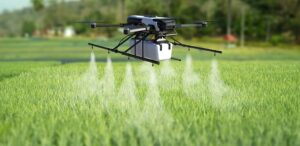Artificial Intelligence (AI) is rapidly transforming various sectors across the globe, and Africa is no exception. Artificial Intelligence (AI) has become a global phenomenon, transforming industries and economies worldwide. In recent years, AI has made significant inroads into various sectors, offering unprecedented opportunities for businesses to optimize operations, improve decision-making processes, and enhance customer experiences. Africa, with its burgeoning private sector, is poised to harness the potential of AI to drive innovation and growth.
The private sector has been one of Africa’s primary drivers of AI development. In this article, we will briefly explore the impact of AI in a few areas (Finance, Healthcare, and Agriculture) on the African private sector, its current state, and its immense potential for the continent’s economic development.
Over the past decade, several companies have strategically integrated intelligent systems as their primary focus or auxiliary tools to enhance their service offerings.
FINANCE
Artificial Intelligence (AI) is being increasingly adopted in the banking sector across Africa. It’s seen as an essential enabler of a new banking model that genuinely responds to customer needs and can benefit all areas of a bank’s operations. For instance, it can be used for smarter profiling and customer interactions that are needs-based and tailored to a customer’s profile. It can also be used in customer servicing to provide more precise and bespoke solutions to customers before they even ask.
Several African banks, including EcoBank, Attijariwafa Bank, United Bank of Africa, Co-operative Bank of Kenya, Nedbank, and Banco Mais, are tapping into IBM technologies to help advance financial inclusion across the continent. These banks use IBM’s hybrid cloud and AI capabilities to unlock digital innovation and develop digital-first solutions. For example, Ecobank has adopted a hybrid cloud approach to extend its reach to millions across Africa. Using IBM Cloud, Ecobank migrated its flagship mobile banking application to leverage the on-demand capacity of resources to support sudden spikes in traffic on its mobile banking services2.
Numerous banks have embraced AI-driven chatbots to simplify customer transactions. For instance, UBA introduced the Leo chatbot, and Access Bank operates Ada, which originated from Diamond Bank before the 2019 merger. There’s also been a significant rise in the number of FinTech startups in Africa, including Flutterwave, Chipper Cash, Paystack, M-Pesa, etc., in which most utilize AI to enhance their operations, such as fraud detection and prevention, customer services, and regulatory compliance.
HEALTHCARE
AI is increasingly gaining prominence within healthcare systems, facilitating the analysis of extensive datasets to enhance efficiency in healthcare delivery and access to medical resources. In Africa, where healthcare institutions frequently grapple with resource shortages and insufficient staffing levels, AI adoption is emerging to compensate for these limitations.
Several African MedTech startups are utilizing AI to transform the healthcare sector. Ubenwa Health has developed the first technology for rapidly detecting neurological and respiratory conditions in infants using only their cry sounds. Dabadoc, a telemedicine Moroccan startup, connects patients with doctors, enhancing the discovery process and allowing patients to easily find and book an appointment with an available doctor nearby that meets their needs at any time and on any device.
Intron Health, a clinical speech recognition startup based in Nigeria, has developed a platform supporting over 200 African accents. The speech-to-text software was built on top of an Electronic Medical Record (EMR) system, which the company provides for hospitals. We have also seen mPedigree, a Ghanaian company that leverages some of the most transformative and innovative technologies, including smart sensors, analytics, and intelligent decision support systems that allow them to analyze large amounts of data and make intelligent decisions to protect consumers from counterfeit products.
LifeBank, based in Nigeria, uses AI-powered logistics to improve access to critical medical supplies, including blood and oxygen. Their platform optimizes supply chain management, reducing waste and ensuring that healthcare facilities receive essential products when and where they are needed most.
AGRICULTURE
The agricultural sector is undergoing a transformation driven by Artificial Intelligence (AI), encompassing technologies such as drones for monitoring crop health and soil moisture and autonomous robots for weed control. Several African startups are harnessing AI to bring about a revolution in agriculture. These companies are pioneering creative solutions to boost crop yields, enhance predictive capabilities, and address the challenges posed by climate change.
Kitovu Technology Company helps African farmers escape poverty by building and deploying climate-smart farming and post-harvest infrastructure to maximize their yield. They offer a range of products to help smallholder farmers optimize their production decisions, increase their yield, and maximize their profits.
Aerobotics, based in South Africa, provides intelligent solutions to agriculture businesses worldwide. Their technology uses artificial intelligence, drones, and robotics to track and assess the health of crops, such as detecting sick trees and monitoring pests and diseases.
SyeComp, a Ghanaian company, uses AI and machine learning to provide various services to farmers and agribusinesses. They use advanced geospatial analytics, machine learning, and remotely sensed data to make better decisions.
CONCLUSION
AI presents a transformative opportunity for the African private sector. With suitable infrastructure, education, and regulation investments, African businesses can harness AI to drive innovation, increase efficiency, and spur economic growth. The emergence of AI startups and innovation hubs across the continent is a testament to AI’s growing interest and potential in Africa. As the African private sector embraces AI, it is poised to play a pivotal role in shaping the continent’s future and realizing its full potential in the global economy.





itstitle
excerptsa